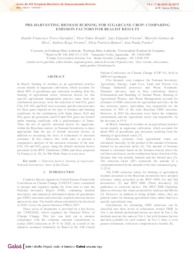Pre-harvesting biomass burning for sugarcane crop: comparing emission factors for realist results.
Pre-harvesting biomass burning for sugarcane crop: comparing emission factors for realist results.
Author(s): GAROFALO, D. F. T.; KONDO, V. Y.; VICENTE, L. E.; SILVA, M. G. da; KOGA-VICENTE, A.; RAMOS, N. P.; PACKER, A. P.
Summary: Abstract: In Brazil, burning of residues as an agricultural practice occurs mainly in sugarcane cultivation, which accounts for about 98% of greenhouse gas emissions resulting from the burning of agricultural waste. Emission factors for this specific agricultural management practice came from the combustion processes, were the emission of non-CO2 gases CH4, CO, NOx and N2O were recorded, and the emission rates for these gases depend on the type of biomass and burning conditions. In the combustion with flame phase, N2O and NOx gases are generated, and CO and CH4 gases are formed under burning conditions with a predominance of flame. Thus, the use of specific emission factors for sugarcane, within the Brazilian context, in National Inventories is more appropriate than the use of default emission factors, in addition to increasing the level of refinement of emission estimates. In this context, this work aims to present a comparative analysis of the emission estimates of the non- CO2, CO and NOX gases, using the default emission factors presented in the IPCC Guidelines (2006) and those proposed by França et al. [4], for São Paulo State as a test area.
Publication year: 2019
Types of publication: Paper in annals and proceedings
Unit: Embrapa Environment
Observation
Some of Embrapa's publications are published as ePub files. To read them, use or download one of the following free software options to your computer or mobile device. Android: Google Play Books; IOS: iBooks; Windows and Linux: Calibre.
Access other publications
Access the Agricultural Research Database (BDPA) to consult Embrapa's full library collection and records.
Visit Embrapa Bookstore to purchase books and other publications sold by Embrapa.

